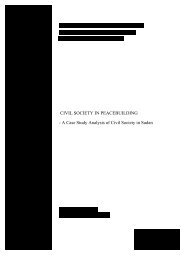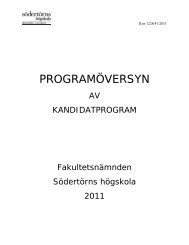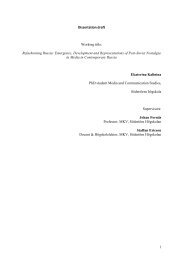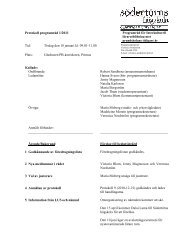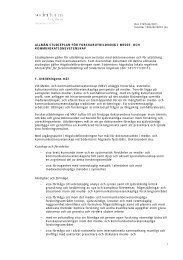Underlying Reasons for the Persistence of Female Genital Mutilation
Underlying Reasons for the Persistence of Female Genital Mutilation
Underlying Reasons for the Persistence of Female Genital Mutilation
You also want an ePaper? Increase the reach of your titles
YUMPU automatically turns print PDFs into web optimized ePapers that Google loves.
human and in such <strong>the</strong>se rights existed pre-society 29 . The human rights <strong>the</strong>ory is largely based on<br />
Western philosophy and has throughout modernization and <strong>the</strong> spread <strong>of</strong> modern markets<br />
expanded through globalization 30 .<br />
The Universalist approach takes an ontological stand in human rights content since it establishes<br />
human rights as something independent <strong>of</strong> our knowledge <strong>of</strong> it. The <strong>the</strong>ory argues that despite<br />
differences in sex, ethnicity or culture, human rights are directed towards all human beings and it<br />
argues its essential standpoint 31 . However <strong>the</strong> idea <strong>of</strong> human rights is constructed by Western<br />
philosophy and has only in recent decades established its ideology in <strong>the</strong> international arena.<br />
There<strong>for</strong>e human rights concepts are socially constructed which questions <strong>the</strong> ontological claim<br />
<strong>of</strong> human rights.<br />
3.1.2 UDHR <br />
Over <strong>the</strong> past decades <strong>the</strong> growth <strong>of</strong> an international human rights regime, based on <strong>the</strong> idea that<br />
human rights should be internationally protected, has set its moral values and political statement<br />
in a fast growing and globalising world. Following <strong>the</strong> Second World War <strong>the</strong> General Assembly<br />
<strong>of</strong> <strong>the</strong> United Nations adopted and proclaimed <strong>the</strong> Universal Declaration <strong>of</strong> Human Rights<br />
(UDHR).<br />
“Whereas recognition <strong>of</strong> <strong>the</strong> inherent dignity and <strong>of</strong> <strong>the</strong> equal and inalienable rights <strong>of</strong> all<br />
members <strong>of</strong> <strong>the</strong> human family is <strong>the</strong> foundation <strong>of</strong> freedom, justice and peace in <strong>the</strong> world,<br />
Whereas disregard and contempt <strong>for</strong> human rights have resulted in barbarous acts which have<br />
outraged <strong>the</strong> conscience <strong>of</strong> mankind... Whereas it is essential, if man is not to be compelled to<br />
have recourse, as a last resort, to rebellion against tyranny and oppression, that human rights<br />
should be protected by <strong>the</strong> rule <strong>of</strong> law…” - United Nations General Assembly, Dec 10 1948<br />
The UDHR was <strong>the</strong> starting point in <strong>the</strong> development <strong>of</strong> global and regional treaties and<br />
declarations concerning human rights, followed by a number <strong>of</strong> Declarations and Conventions<br />
which embody human rights principals, as well as <strong>the</strong> emergence <strong>of</strong> non-governmental<br />
29 Donnelly, The relative universality <strong>of</strong> human rights. p. 284 <br />
30 Ibid, p. 287 <br />
31 Marsh, Stoker, Theory and methods in political science, p. 18 -‐19 <br />
14





